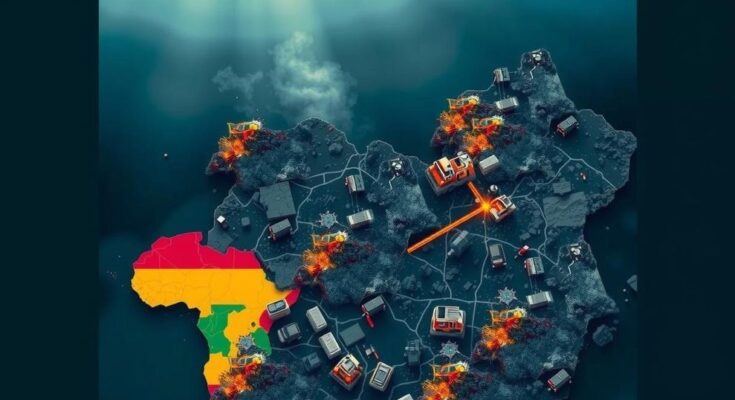Ghana’s presidential election is overshadowed by the illegal mining crisis known as ‘galamsey’. Miners are driven by poverty and unemployment, resulting in environmental degradation, particularly affecting the cocoa sector and water bodies. Candidates must confront these pressing issues, balancing economic survival with ecological responsibility amidst rising public frustration over ineffective government responses.
At a muddy mining site near Accra, the illegal gold mining phenomenon known as “galamsey” persists, reflecting the urgent need for an examination of its implications just days before Ghana’s presidential election. Miners, driven by dire economic circumstances, engage in hazardous activities that damage the environment, pollute waterways, and undermine agricultural productivity. The ruling New Patriotic Party (NPP) candidate, Vice President Mahamudu Bawumia, competes against former President John Mahama from the National Democratic Congress (NDC) amid voters’ frustrations about inadequate employment opportunities and deteriorating natural resources.
The ongoing illegal mining crisis poses significant challenges to Ghana, a nation rich in resources yet grappling with unemployment and ecological degradation. The cocoa sector, vital for national revenue, has seen extensive damage, with over 19,000 hectares lost to mining activities. As the country heads to the polls, the ramifications of these unlawful practices are at the forefront of political discourse, with many young voters viewing the issue as emblematic of government failures. Calls for sustainable solutions echo throughout the population, amidst skepticism over political candidates’ promises to address galamsey effectively.
The devastating impact of illegal mining extends beyond the immediate geophysical destruction; it threatens the livelihoods of countless individuals and the ecological balance essential for sustainability. Young men like Frank, a miner who spoke on condition of anonymity, illustrate the desperation behind the industry’s rise, stating, “For 16 years, this is what I’ve done to survive. We know our activities harm the land and pollute the rivers, but what choice do we have? There are no jobs.” As political candidates prepare to take office, the need for effective stakeholder engagement and responsible mining practices becomes increasingly urgent.
Historical commitments by the NPP to eradicate illegal mining have yet to yield significant results; meanwhile, public demonstrations underscore the mounting frustration with ineffective enforcement and environmental damage. It is imperative for the next administration to formulate comprehensive strategies that engage all stakeholders to restore the integrity of Ghana’s natural resources while providing viable employment opportunities for its citizens. The outcome of the imminent election may very well set the stage for how the nation confronts this pressing environmental and economic crisis.
The article addresses the ongoing crisis of illegal mining in Ghana, particularly its local manifestation known as ‘galamsey’. The term refers to unregulated gold mining activities that have proliferated due to high unemployment rates and increasing gold prices. This situation poses severe ecological consequences, including land degradation, water pollution, and adverse effects on agricultural practices, particularly cocoa production. As Ghana approaches a presidential election, the societal and environmental ramifications of illegal mining have become crucial issues that candidates must address to gain voter support.
In conclusion, Ghana is at a critical junction where the outcomes of the upcoming presidential election could significantly influence the course of illegal mining and its implications for the environment and economy. The ongoing “galamsey” crisis highlights the need for effective government intervention that balances economic needs with ecological sustainability. As voters consider their options, the challenge remains for political leaders to develop actionable strategies that not only address illegal mining but also provide viable alternatives to communities dependent on these practices.
Original Source: www.cbs19news.com




